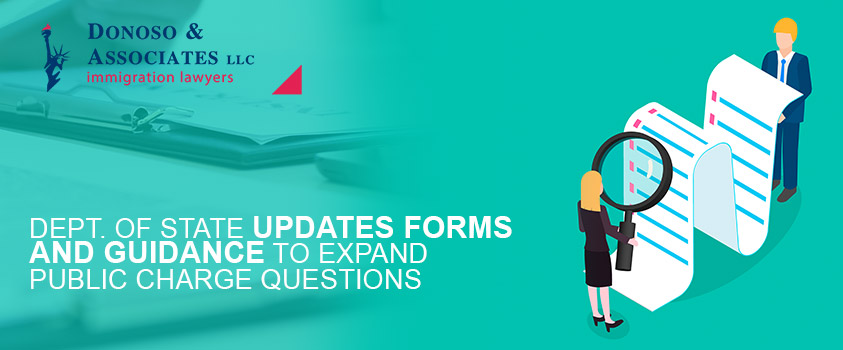WASHINGTON DC, MARCH 4, 2020: The US Department of State (DOS) has revised the Foreign Affairs Manual’s section on Public Charge to bring it into line with what the Department of Homeland Security has done with USCIS regulations.
The DOS has also finalized Form DS-5540 which is akin to USCIS’ Form I-944 (although much shorter).
The DOS Form DS-5540 does not have formal instructions but the FAM does have some helpful information as well as this article below:
9 FAM 302.8
(U) PUBLIC CHARGE – INA 212(A)(4)
(2) (U) Evidence of Assets, Resources and Financial Status: In examining specific aspects of the applicant’s assets, resources, and financial status, you should consider, in particular:
(a) (U) As to the applicant’s gross household income, excluding any public benefits;
(i) (U) For employment-based immigrant visa applicants who are subject to public charge, you may take into consideration the expected income listed on the Labor Certification (or any updated salary information provided by the petitioner) plus any income that the applicant lists in the DS-5540, Public Charge Questionnaire, that will continue to be received after admission to the United States.
(ii) (U) For all other immigrant visa applicants, you may take into consideration any income that the applicant lists in the DS-5540, Public Charge Questionnaire, that will continue to be received after admission to the United States plus any potential income based on expected employment.
(b) (U) Any additional income from individuals not included in the applicant’s household who physically reside with the applicant and whose income will be relied upon to meet the standard in paragraph 1 above;
(c) (U) Any additional income provided to the applicant by another person or source not included in the applicant’s household on a continuing monthly or yearly basis for the most recent calendar year, excluding any public benefits;
(d) (U) The household’s cash assets and resources, including checking and savings account statements covering 12 months prior to filing the visa application;
(e) (U) The household’s non-cash assets and resources that can be converted into cash within 12 months, such as the net cash value of real estate holdings minus the sum of all loans secured by a mortgage, trust deed, or other lien on the home; annuities; securities; retirement and educational accounts; and any other assets that can easily be converted into cash.
(3) (U) Documenting Assets, Resources, and Financial Status in DS-Form 5540, Public Charge Questionnaire:
(a) (U) Immigrant Visa Applicants: All immigrant visa applicants subject to INA 212(a)(4) must complete and submit a Form DS-5540, Public Charge Questionnaire. (If a family unit applies together, only one form is required). The DS-5540 provides information to assist you in determining whether the applicant is more likely than not to become a public charge, based on the totality of the applicant’s circumstances. Unless specified on Form DS-5540, applicants are not required to submit supporting documentation. However, if you determine documentary evidence is necessary, you may request an applicant to establish the adequacy of financial resources by submitting, for example, evidence of bank deposits, ownership of property or real estate, ownership of stocks and bonds, insurance policies, or income from business investments, as well as those of any household members.
(b) (U) Nonimmigrants: You may request a nonimmigrant visa applicant to complete the Form DS-5540 in any case where you believe additional information is necessary to determine whether the individual’s assets, resources, and financial status are sufficient to address any concerns about eligibility on public charge grounds. Alternatively, you may ask the applicant(s) any or all of the questions from Form DS-5540 necessary for you to make the public charge determination (including orally).
(5) (U) Informing Applicants of Required Documentation: Post will necessarily process some cases that were documentarily qualified by NVC or KCC prior to the effective date of the public charge rule or without the DS-5540. To help ensure a smooth transition, you should make every effort to inform applicants in advance of the visa interview of supporting documents that will help you resolve a public charge determination. This could include a request that applicants complete and upload the DS-5540 to the CEAC, or bring it with them to the interview. Posts may also request applicants bring with them to the interview supporting financial documents or other documentation post knows would be relevant. Ideally, you should be in a position to assess whether applicants are ineligible for visas under INA 212(a)(4) at the end of the initial visa interview, assuming that the applicant has made reasonable efforts to submit the evidence originally requested. Applicants who you determine are more likely than not to become a public charge at any time after admission even after the presentation of additional evidence, should be refused under INA 212(a)(4) instead of INA 221(g); however, you must provide applicants an opportunity to provide a completed DS-5540 before you refuse an application under INA 212(a)(4). Adequate time and effort spent prior to and during the initial interview can save work for the post and the applicant in this respect.
Donoso & Associates, a leading immigration law firm based in Washington, D.C., will continue to report on developments regarding the immigration law and policy through our news section of donosolaw.com.
SCHEDULE A CONSULTATION TODAY.
I.A. Donoso & Associates provide assistance with review and advice regarding eligibility for visas to the U.S. or Canada.
